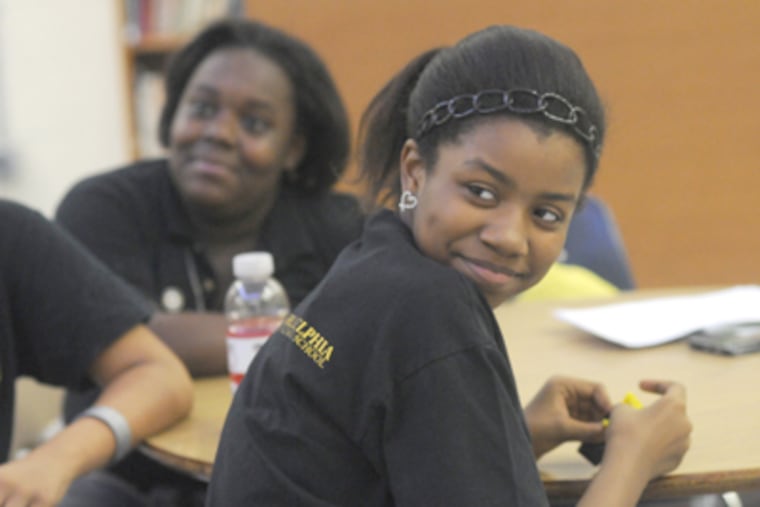Empowering students to improve middle-school culture
Educator Paul Dean posed a few thought-provoking questions to 10 sixth and seventh graders recently at a West Philadelphia charter school.

Educator Paul Dean posed a few thought-provoking questions to 10 sixth and seventh graders recently at a West Philadelphia charter school.
"Is it really possible to change the way others think and act, and how? And are people born with the ability to influence others, or is that something that can be developed?"
A program he and fellow Teach For America alum Bobby Erzen founded aims to help students find the answers.
Based on their experiences during Teach For America assignments in New Orleans, the pair in 2010 created a program to train middle-school students with leadership potential to exercise it in their schools. The goal is to empower them to improve school culture.
"I think the model that exists now is very top-down, where teachers are responsible for everything," said Erzen, a graduate of California Polytechnic State University who has taught seventh-grade math. "There is an untapped resource in the schools, and that's the students. They're not challenged to take ownership of their schools."
He said Dean had drawn on work by various researchers and shaped a curriculum for middle schoolers.
"It's bits and pieces from different places," Erzen said. "It's all instructionally sound."
And the skills covered in the sessions - team-building, influencing others, delegating responsibility, running meetings, communicating expectations, and implementing action plans - have applications far beyond the classroom.
"They can use these forever," Erzen said.
After a successful tryout during the last academic year at a charter school in New Orleans, Dean and Erzen, both 25, brought their Student Leadership Project to the Philadelphia area.
The two have been working with students at KIPP West Philadelphia Charter School and Freedom Academy Charter School in Camden since September.
Seventh and eighth graders at Freedom Academy completed conflict-mediation training to help reduce tensions in their school.
And sixth and seventh graders at KIPP West Philadelphia helped improve the schoolwide homework completion rate by 15 percent by phoning students who had not been completing assignments. They organized pizza lunches to recognize classmates who now were turning in work.
"I think this program is great," said Lavon Edwards, 12, a seventh grader at KIPP. "This is a good school, but there are some things . . . that need improvement. I'm in this group so I can help to improve the school."
The Student Leadership Project came to Philadelphia for several reasons: the concentration of charter schools - 80 in the city alone. And the region is considered a hotbed of educational experiments.
There were personal reasons, as well. Dean, a Yale graduate, has family in the Northeastern part of the country.
"I knew I was coming back this way," he said. "My fiancee has family here, too. And she is actually at Penn Law now."
He and Erzen work with students at least three days a week during extracurricular periods and on Saturdays.
Participating students were recommended by teachers for their leadership potential.
With the help of interns from Penn and Rutgers-Camden, Dean and Erzen lead the students in discussions and role-playing exercises. They help them polish public-speaking skills and work on plans to make their schools better.
In the first year, the program is offered to the two charters without charge. The nonprofit is raising money from private sources for its $166,000 annual budget.
Erzen said the project aims to raise more money to help it expand in 2012-13.
The students choose the school-improvement projects. At KIPP West Philadelphia, they decided to make their school better by focusing on homework.
"Homework was an idea they jumped on right away," Dean said. "I think that's partly because KIPP does a good job of making that visible to them. They post the homework statistics, and they really believe that homework is one of the biggest indicators of future college success."
Students began phoning classmates who were not turning in assignments.
"It's important to encourage people to do their homework," said seventh grader Chanell Johnson, 12.
Students who don't, she said, have lower grades, and that hurts their chances of getting into good high schools.
The calls paid off. Last month, KIPP met a schoolwide goal of 90 percent homework completion.
"What it did was it started to get our kids talking about homework," said Shawna Wells, the top administrator at KIPP West Philadelphia.
KIPP West Philadelphia is part of a national network of charter schools affiliated with the California nonprofit Knowledge Is Power Program, which focuses on college preparation.
Even before Erzen and Dean arrived, Wells said, her school had decided to stress leadership by giving each student a specific responsibility.
"This really aligned with what we were doing," she said. "We thought it was a perfect fit."
But with the Student Leadership Project, she said the students were taking on even more responsibilities.
"Their peers," she said, "are telling them it's a cool thing to be a leader."